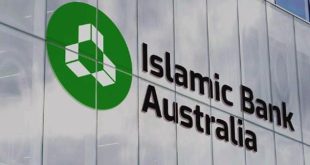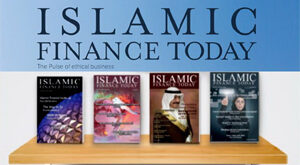The mentality of reckless greed and the resulting spread of toxic financial externalities into the ‘real economy’ can be viewed as being diametrically at the opposite end of Islamic finance, in theory at least. This year has witnessed the most serious break-down in the US financial system in some 70 years. However it is not only the US that has been affected. It has spread out across the globe touching Islamic finance as well.
Should we be surprised? Many commentators have been forecasting something of this nature for a number of years based on the underlying concerns regarding the US economy. The Research Intelligence Unit for example has been following the series of events that have led up to this year’s collapse and gave out warnings of such a shock for a number of years. Whilst no one could predict the precise moment of events as they unfolded, many were sounding the alarm that the rails were loose but the train kept on moving at full speed until its inevitable derailment.
As economist James Galbraith says, a well-functioning financial system has rules and it’s when the rules are relaxed that shady practices and get rich quick schemes flourish. This is what happened in the [sub-prime] mortgage system in 2005 and 2006, triggering off a bigger collapse. This collapse has spread out to the entire globalized economy. The implications of the financial crunch and the subsequent bail-out on the US economy and its currency, the global commodity markets, on other major economies in Europe, India, China and the wider world are yet to be fully realized.
There are of course developing nations like Sri Lanka, for instance, which is said to be somewhat insulated from the US led meltdown due to the lower levels of financial integration with the global system. However, many people with foreign income are affected and this would have an impact on the demand for luxury goods like local condominiums and vehicles. For the average citizen, the impact of lower demand for the island’s exports will have a significant impact on their economic well-being. The garment industry was perhaps the first to feel the pinch from declining US demand. Moreover the uncertainty regarding the availability of finance as well as the negative sentiments prevailing in most of Sri Lanka’s export markets has hit many exports. The negative impact on the Colombo tea auctions has been acute to the extent that the government had to intervene with a home-spun bail-out package.
Conspiratorial context
So how long will the global recession last? From a historical perspective, the series of events that have taken place of late are in keeping with the recent pattern that has been characterized by a shift in economic power from the West to the East, particularly in the direction of India and China. The markets in Europe have had severe slumps at various times during the past few decades and recession has always followed. The early nineties was a case in point for the UK whilst the US had a recession in 2001. Meanwhile, strong growth has characterized Asian economies during the same period with increasing trade volumes being a driving factor of the growth. The difference with the latest shock to the market is the sheer magnitude of the collapse that has touched all corners of the world economy.
However, if we go back even further, to the 19th century, we could find some comfort in the knowledge that financial markets have always fluctuated, slumped and recovered. Conspiracy theorists have always asserted that shadowy and powerfully figures that lurk behind the scenes have always made a killing on depreciated stocks each and every time there was a recession or depression. The grey area between public and private finance is said to offer ample scope for taking advantage of such times for those on the sunny side of asymmetrical market information.
A case in point, when Napoleon escaped from Elba in 1815, the London gold market hiked overnight by over 25 percent as the UK treasury gave orders to dispatch gold to the Duke of Wellington who was preparing to stop Napoleon with military force. Only following the decisive battle of Waterloo did gold prices ease. So those in the know made plenty of bucks in the meantime.
Returning to this generation, Gary Allen wrote in 1979; “Whatever the future holds, you can bet it will be unstable with wide swings in the value of the dollar and precious metals. As long as Volcker’s sponsors know in advance what his policies will be, they will make big money.” This accurate prediction was followed by 20 percent interest and 25 percent inflation.
In another example, Business week, Feb. 20, 1984, stated, “The worst market for traders is a stable one…. Investment banks now have a greater than ever vested interest in market instability. They can rack up enormous profits by guessing right about rapid, wide swings in profits, prices and interest rates.” It is obvious that they can rack up “enormous profits” if they know in advance what the monetary decisions will be.
Eustace Mullins in his book The World Order – A Study in the Hegemony of Parasitism (1985) says: “Anyone who seriously believes that no one knows in advance what Federal Reserve decisions will be is too naive to be allowed out on their own; anybody who believes that there is no one who can tell the Federal Reserve Board what its policies are to be is even more out of touch with reality”.
According to some sources, including Bloomberg, the bailout itself is likely to result in a skewed distribution of rescue funds. As the man in charge of the rescue package is a Wall Street veteran, the Wall Street bailout has the danger of being biased in favour of the special interests that have a greater influence on those holding the purse strings. Goldman Sachs and Morgan Stanley are amongst some of the names that are said to be in the list of institutions that will benefit disproportionately from the $700 tax-payer allocation. With some ten percent of the $700 billion going directly to those responsible for the mess in the form of due payments and incentives to top executives, the guilty don’t seem to have done too badly this time around either.
Shari’ah consequences
Some observers have claimed that Islamic finance which has been on a spectacular growth path over the past seven years might actually benefit from the collapse in confidence in the conventional financial system. The financial consultant agency BDO Stoy Haywood for instance has claimed that increasing numbers of investors will now turn to the Shari’ah compliant financial sector as they have far less exposure to the ‘toxic debt’ that characterizes the US finance institutions. There is information from the UK to suggest that this is already taking place, not just amongst the Muslim communities but also amongst non-Muslims who are vexed at what’s going on.
Statistics tell their own story. The Dow Jones Islamic Market (DJIM) index only lost 2.74 percent in September whilst almost all other indices around the world shed around 20 percent. The Sukuk (Islamic bond) index of City group was the best performer, loosing only 0.27 per cent and was the only index anywhere to remain positive for the year to date (October). However, the overall level of sukuk issues for the year thus far remains well down as compared to 2007. The Secretary-General of the Accounting and Auditing Organization for Islamic Financial Institutions (AAOIFI) told a conference in Dubai recently that only $14 billion worth of sukuk had been issued so far this year, compared with $40-50 billion last year.
Many jobs are also at stake as the current crisis is likely to shift the labour market supply curve to the right. With lots of moving and shaking going on in the conventional sector as everyone from the janitors to senior banking professionals feels the threat of retrenchment, Islamic banking could use this opportunity to do some head-hunting that can compensate for the gap in current demand for qualified Shari’ah compliant finance professionals. Failure on the part of vocational and academic institutions to keep pace with the demand for professionally qualified people in the Shari’ah compliant industry has resulted in a shortfall in professionals amidst growing demand.
Other opportunities may also arise with more high-net-worth individuals switching to the ‘safer bet’ Shari’ah compliant option. The operation of Wealth Management arms of conventional banks as well as independent financial agencies have witnessed strong growth in recent years especially in South Asia where there has been an increasing demand for wealth management services amongst a growing middle and upper class.
However, anyone expecting a sea-saw effect on the Islamic finance sector would be out of touch with reality. The financial crunch has resulted in falling commodity prices, especially oil along with a marked drop in real estate prices which has started to hit the Shari’ah compliant sector. The direct impact comes from the fact that the Shari’ah compliant sector relies on these real assets in order to support Shari’ah compliant finance deals. So to some extent, the current situation has demonstrated that Islamic finance is operating in a distinctly un-Islamic economic system whereby Shari’ah compliant windows get directly affected when the house catches fire.
Opportunities
So to some extent the current situation offers an optimal opportunity for Islamic economists and academics to put forward an alternative system. Adnan Khan notes a number of key points that we can build on to stress the fundamental difference between the two systems of finance and economics. Some of these differences are fundamental and too far reaching to deal with in the short term even though the glaring weaknesses in the conventional system have surfaced for all to see. Take for instance the paper currency system that is backed up by absolutely nothing tangible since 1972. Any system claiming to be Islamic has to be based on silver, gold or a similar commodity of value.
Likewise Islamic economics cannot promote a so-called dual-economy separating the ‘financial and ‘real’ segments. Everything would be real. Much of the dealings that take place in the ‘financial economy’ are anyway prohibited under Islam. Banks would be active in performing many of their functions as collectors of deposits in order to reinvest funds in to the ‘real economy’.
Similarly, under an Islamic system taxation would be based on wealth and not income. Ownership rights too would be distinguished into state, public and private. Many resources would fall into the category of public property whereby their benefit would have to be open for enjoyment by all citizens. This is derived from the hadith of the Prophet: “Muslims are partners in three things: in water, pastures and fire”. The implications of this hadith is that water resources, forests, firewood, pastures for livestock, electricity and oil fields and refineries belong to the community. Thus, the privatization of water for example would not be permitted.
Outlook
The Shari’ah compliant sector’s ability to draw in both Muslims and non-Muslims will depend on how well this alternative system is marketed as a more stable and ethical long-term option. The industry will also have to withstand opposition from anti-Shari’ah finance groups, mostly based in the US who spread myths about its dangers to Western civilization.
Essentially, the message that the Islamic banking sector engages in lower risk profile investments should be in tune with current times. It also abstains from a number of unethical practices including ‘short-selling’ which describes selling a stock which you do not own in order to benefit from its falling price. Even the US banned this practice for a limited time in the aftermath of the Lehman collapse but then reversed the ruling.
The world economic outlook report of the IMF has claimed that the ‘world economy is entering a major downturn in the face of the most dangerous shock in the mature financial markets since the 1930’s’. Whilst the global economy grew by 3.9 per cent in 2007, the forecast for 2008 has been revised down to 3.9 per cent and just three percent for 2009. This would make 2009 the worst year since 2002 according to the IMF.
Since the report was released, the Central Banks of a number of powerhouse economies made a unison rate cut. These included the US and the UK which slashed their rates by 0.5 per cent whilst China, Canada, Sweden and Switzerland also cut their rates. The IMF supported the move that was aimed at mitigating the impact of the credit squeeze on the real economy.
Offering some hope for the battered economies, the IMF report did claim that there is ‘no risk of a Great Depression’. However, subsequent information suggested otherwise as economies in Europe including the powerhouse Germany which claimed they were now officially in recession. A G20 meeting was hosted by G.W Bush in November where further attempts at facing the challenge in concert were made. This represents a style u-turn on the part of the most unilateral US leader as his last days in office seem to have witnessed a shift towards multilateralism.
The coming year 2009 is likely to pose stiff challenges to the Islamic finance industry despite a steady and consistent increase in the demand forecast. Lower credit availability in 2009, slack demand from the developed world that will reduce commodity prices, and uncertainty regarding currency are all likely to pose serious challenges. In the final analysis, there will be few winners.
Politically, the evolving scenario is likely to offer greater influence and sway to the larger developing nations on the world stage. This might also open more doors for Shari’ah compliant finance to be discussed and debated on the world stage. One can only hope for change that will lead to the emergence of a more ethical economic system for all concerned.
Sources: Al Jazeera, BBC, Bloomberg, China Peoples Daily, Conway, Edmond, IMF, www.informaitonclearinghouse.com, Kettell, Brian, Pakin, Brian, Research Intelligence Unit, Trends Research, Eustace Mullins.
© Islamic Finance Today – Pioneer Publications (Pvt) Ltd
 Sri lanka Muslims Web Portal Diversity and Inclusiveness
Sri lanka Muslims Web Portal Diversity and Inclusiveness



